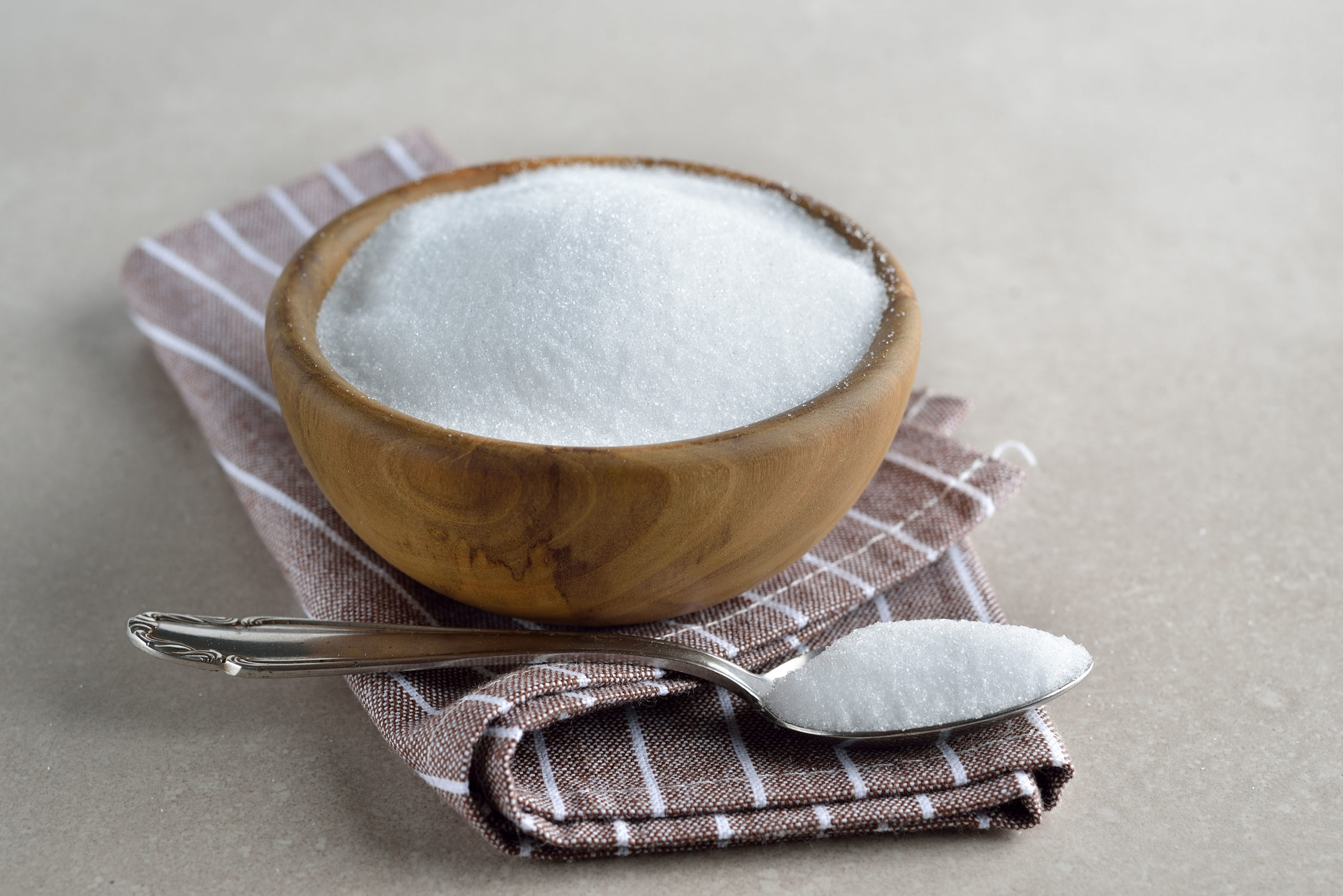Zero calorie sweetener linked to heart attack and stroke, study finds
Feb 27, 2023, 12:00 PM

Healthy sugar substitute erythritol on a gray background
(CNN) — A sugar replacement called erythritol — used to add bulk or sweeten stevia, monk-fruit, and keto reduced-sugar products — has been linked to blood clotting, stroke, heart attack and death, according to a new study.
“The degree of risk was not modest,” said lead author Dr. Stanley Hazen, director of the center for cardiovascular diagnostics and prevention at the Cleveland Clinic Lerner Research Institute.
People with existing risk factors for heart disease, such as diabetes, were twice as likely to experience a heart attack or stroke if they had the highest levels of erythritol in their blood, according to the study published Monday in the journal Nature Medicine.
“If your blood level of erythritol was in the top 25% compared to the bottom 25%, there was about a two-fold higher risk for heart attack and stroke. It’s on par with the strongest of cardiac risk factors, like diabetes,” Hazen said.
Additional lab and animal research presented in the paper revealed erythritol appeared to be causing blood platelets to clot more readily. Clots can break off and travel to the heart, triggering a heart attack, or to the brain, triggering a stroke.
“This certainly sounds an alarm,” said Dr. Andrew Freeman, director of cardiovascular prevention and wellness at National Jewish Health, a hospital in Denver, Colorado, who was not involved in the research.
“There appears to be a clotting risk from using erythritol,” Freeman said. “Obviously, more research is needed, but in an abundance of caution, it might make sense to limit erythritol in your diet for now.”
In response to the study, the Calorie Control Council, an industry association, told CNN that “the results of this study are contrary to decades of scientific research showing reduced-calorie sweeteners like erythritol are safe, as evidenced by global regulatory permissions for their use in foods and beverages,” said Robert Rankin, the council’s executive director, in an email.
The results “should not be extrapolated to the general population, as the participants in the intervention were already at increased risk for cardiovascular events,” Rankin said.
The European Association of Polyol Producers declined to comment, saying it had not yet reviewed the study.
What is erythritol?
Like sorbitol and xylitol, erythritol is a sugar alcohol — a carb found naturally in many fruits and vegetables. It has about 70% of the sweetness of sugar and is considered zero calorie, according to experts.
Artificially manufactured in massive quantities, erythritol has no lingering aftertaste, doesn’t spike blood sugar and has less of a laxative effect than some other sugar alcohols.
“Erythritol looks like sugar, it tastes like sugar and you can bake with it,” said Hazen, who also directs the Cleveland Clinic’s Center for Microbiome and Human Health.
“It’s become the sweetheart of the food industry, an extremely popular additive to keto and other low-carb products and foods marketed to people with diabetes,” he added. “Some of the diabetes-labeled foods we looked at had more erythritol than any other item by weight.”
Erythritol is also the largest ingredient by weight in many “natural” stevia and monk-fruit products, Hazen said. Because stevia and monkfruit are about 200 to 400 times sweeter than sugar, just a small amount is needed in any product. The bulk of the product is erythritol, which adds the sugar-like crystalline appearance and texture consumers expect.
An unexpected discovery
The discovery of the connection between erythritol and cardiovascular issues was purely accidental, Hazen said: “We never expected this. We weren’t even looking for it.”
Hazen’s research had a simple goal — find unknown chemicals or compounds in a person’s blood that might predict their risk for a heart attack, stroke or death in the next three years. To do so, the team began analyzing 1,157 blood samples in people at risk for heart disease collected between 2004 and 2011.
“We found this substance that seemed to play a big role, but we didn’t know what it was,” Hazen said. “Then we discovered it was erythritol, a sweetener.”
The human body naturally creates erythritol, but in very low amounts that would not account for the levels they measured, Hazen said.
To confirm the findings, Hazen’s team tested another batch of blood samples from over 2,100 patients in the United States and an additional 833 samples gathered by colleagues in Europe through 2018. About three quarters of the participants in all three populations had coronary disease or high blood pressure and about a fifth had diabetes, Hazen said. Over half were male and in their 60s and 70s.
In all three populations researchers found higher levels of erythritol were connected to a greater risk of heart attack, stroke or death within three years.
But why? To find out, researchers did further animal and lab tests and discovered erythritol was “provoking enhanced thrombosis,” or clotting in the blood, Hazen said.
Clotting is necessary in the human body or we would bleed to death from cuts and injuries. The same process is constantly happening internally, as well.
“Our blood vessels are always under pressure and we spring leaks, and blood platelets are constantly plugging these holes all the time,” Hazen said.
However, the size of the clot made by platelets depends on the size of the trigger that stimulates the cells, he explained. For example, if the trigger is only 10%, then you only get 10% of a clot.
“But what we’re seeing with erythritol is the platelets become super responsive — a mere 10% stimulant produces 90 to 100% of a clot formation,” Hazen said.
“For people who are at risk for clotting, heart attack and stroke — like people with existing cardiac disease or people with diabetes — I think that there’s sufficient data here to say stay away from erythritol until more studies are done,” Hazen said.
Oliver Jones, a professor of chemistry at RMIT University in Victoria, Australia, who was not involved in the research, noted that the study had only revealed a correlation, not causation.
“As the authors themselves note, they found an association between erythritol and clotting risk, not definitive proof such a link exists,” said Jones in a statement.
“Any possible (and, as yet unproven) risks of excess erythritol would also need to be balanced against the very real health risks of excess glucose consumption,” Jones said.
Healthy volunteers
In a final part of the study, eight healthy volunteers drank a beverage that contained 30 grams of erythritol, the amount many people in the US consume, Hazen said, according to the National Health and Nutrition Examination Survey, which examines American nutrition each year.
Blood tests over the next three days tracked erythritol levels and clotting risk.
“Thirty grams was enough to make blood levels of erythritol go up a thousandfold,” Hazen said. “It remained elevated above the threshold necessary to trigger and heighten clotting risk for the following two to three days.”
Just how much is 30 grams of erythritol? The equivalent of eating a pint of keto ice cream, Hazen said.
“If you look at nutrition labels on many keto ice creams, you’ll see ‘reducing sugar,’ or ‘sugar alcohol,’ which are terms for erythritol. You’ll find a typical pint has somewhere between 26 and 45 grams in it,” he said.
“My co-author and I have been going to grocery stores and looking at labels,” Hazen said. “He found a ‘confectionery’ marketed to people with diabetes that had about 75 grams of erythritol.”
There is no firm “accepted daily intake,” or ADI, set by the European Food Safety Authority or the US Food and Drug Administration, which considers erythritol generally recognized as safe (GRAS).
“Science needs to take a deeper dive into erythritol and in a hurry, because this substance is widely available right now. If it’s harmful, we should know about it,” said National Jewish Health’s Freeman.
Hazen agreed: “I normally don’t get up on a pedestal and sound the alarm,” he said. “But this is something that I think we need to be looking at carefully.”
The-CNN-Wire™ & © 2023 Cable News Network, Inc., a Warner Bros. Discovery Company. All rights reserved.













